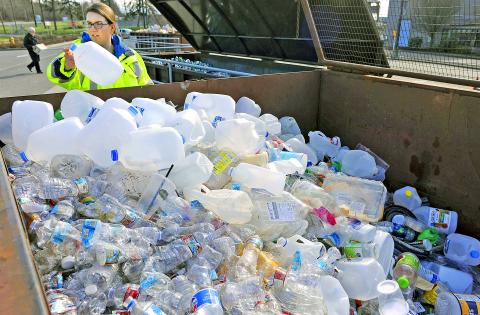China’s decision to stop accepting plastic waste from other nations is causing plastic to pile up around the globe, and wealthy countries must find a way to slow its accumulation, scientists said.
The scientists sought to quantify the effects of the Chinese import ban on the worldwide trade in plastic waste and found that other nations might need to find a home for more than 110 million tonnes of plastic by 2030.
The ban went into effect on Dec. 31 last year, and the stockpiling trend is to worsen, they said.

Photo: AP / Skagit Valley Herald
The study, “The Chinese import ban and its impact on global plastic waste trade,” was published on Wednesday in the journal Science Advances.
Wealthy nations such as the US, Japan and Germany have long sent their plastic recyclables to China, but the country does not want to be the world’s dumping ground for plastic anymore.
The study found that China has since 1992 taken more than 105 million tonnes of the material, the equivalent of the weight of more than 300 Empire State Buildings.
The change is forcing countries to rethink how they deal with plastic waste.
They need to be more selective about what they choose to recycle and more fastidious about reusing plastics, said Amy Brooks, first author on the study and a doctoral student in engineering at the University of Georgia.
In the meantime, more plastic waste is likely to get incinerated or sent to landfills, Brooks said.
“This is a wake-up call. Historically, we’ve been depending on China to take in this recycled waste and now they are saying no,” she said. “That waste has to be managed and we have to manage it properly.”
Using UN data, the study found that China has dwarfed all other plastics importers, accounting for about 45 percent of the world’s plastic waste since 1992.
The ban is part of a larger crackdown on foreign garbage, which is viewed as a threat to health and the environment.
Some nations that have seen an increase in plastic waste imports since China’s ban — such as Thailand, Vietnam and Malaysia — are already looking to enforce bans of their own because they are quickly becoming overburdened, Brooks said.
The study says that plastic is more difficult to recycle than other materials, such as glass and aluminum, said Sherri Mason, chair of the department of geology and environmental sciences at the State University of New York at Fredonia.
Many consumers try to recycle plastics that cannot be recycled, Mason said, adding that one solution could be to simplify the variety of plastics used to make products.
“We have to confront this material and our use of it, because so much of it is single-use disposable plastic and this is a material that doesn’t go away,” Mason said. “It doesn’t return to the planet the way other materials do.”
The US National Recycling Coalition last month said in a statement that it must “fundamentally shift how we speak to the public” and “how we collect and process” recyclables.
“We need to look at new uses for these materials,” coalition executive director Marjorie Griek said. “And how do you get manufacturers to design a product that is more easily recyclable?”

Yemen’s separatist leader has vowed to keep working for an independent state in the country’s south, in his first social media post since he disappeared earlier this month after his group briefly seized swathes of territory. Aidarous al-Zubaidi’s United Arab Emirates (UAE)-backed Southern Transitional Council (STC) forces last month captured two Yemeni provinces in an offensive that was rolled back by Saudi strikes and Riyadh’s allied forces on the ground. Al-Zubaidi then disappeared after he failed to board a flight to Riyadh for talks earlier this month, with Saudi Arabia accusing him of fleeing to Abu Dhabi, while supporters insisted he was

‘SHOCK TACTIC’: The dismissal of Yang mirrors past cases such as Jang Song-thaek, Kim’s uncle, who was executed after being accused of plotting to overthrow his nephew North Korean leader Kim Jong-un has fired his vice premier, compared him to a goat and railed against “incompetent” officials, state media reported yesterday, in a rare and very public broadside against apparatchiks at the opening of a critical factory. Vice Premier Yang Sung-ho was sacked “on the spot,” the state-run Korean Central News Agency said, in a speech in which Kim attacked “irresponsible, rude and incompetent leading officials.” “Please, comrade vice premier, resign by yourself when you can do it on your own before it is too late,” Kim reportedly said. “He is ineligible for an important duty. Put simply, it was

The Chinese Embassy in Manila yesterday said it has filed a diplomatic protest against a Philippine Coast Guard spokesman over a social media post that included cartoonish images of Chinese President Xi Jinping (習近平). Philippine Coast Guard spokesman Jay Tarriela and an embassy official had been trading barbs since last week over issues concerning the disputed South China Sea. The crucial waterway, which Beijing claims historic rights to despite an international ruling that its assertion has no legal basis, has been the site of repeated clashes between Chinese and Philippine vessels. Tarriela’s Facebook post on Wednesday included a photo of him giving a

Syrian President Ahmed al-Sharaa on Sunday announced a deal with the chief of Kurdish-led forces that includes a ceasefire, after government troops advanced across Kurdish-held areas of the country’s north and east. Syrian Kurdish leader Mazloum Abdi said he had agreed to the deal to avoid a broader war. He made the decision after deadly clashes in the Syrian city of Raqa on Sunday between Kurdish-led forces and local fighters loyal to Damascus, and fighting this month between the Kurds and government forces. The agreement would also see the Kurdish administration and forces integrate into the state after months of stalled negotiations on